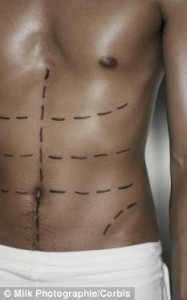The Harley Medical Group can confirm that confidence is the number one reason people cite as the reason for having a surgical procedure. People want to wear and bare but confidence is the key internal emotion that manifests in our behaviour.
Speaking about this Liz Dale, director of The Harley Medical Group said: “We see a large number of clients every day when asked why the client wants to have a procedure done the number one reason cited is confidence.
“When we are not confident/happy about certain elements of our physical features (and women win hands down in this area), we tend to ‘cover up’ with make-up, clothing or we become hermits. When we are happy we let the whole world see!
“However there are lots of myths around cosmetic surgery. 95% of people only have one procedure that they have been thinking about for several years.â€
The following are 8 common myths about cosmetic surgery:
8.
MYTH: Having cosmetic surgery is like redecorating your house, once you’ve done one room, you move onto the next i.e. once you’ve had a nose job for example, you’ll have breast enlargement surgery next.
FACT: 95% of patients will only have one procedure that they’ve been thinking about for several years. It’s a confidence thing with many people.
7.
MYTH: Women who have boob jobs want to look like Jordan.
FACT: Most women only go up by one or two cup sizes and the average size is a C cup. Women also now want a more natural look and so opt for a tear-drop shaped breast implant rather than the traditional round high contour.
6.
MYTH: Cosmetic surgery is now so commonplace; most people view it as a beauty treatment and book it in for the next week.
FACT: Research shows that on average patients think about their surgery for two to three years.
5.
MYTH: More men are now having cosmetic surgery than women!
FACT: There’s been a huge growth in men having surgery, but they still only make up 20% of patients, according to The Harley Medical Group.
4.
MYTH: If you’re standing in the supermarket queue, chances are someone in that queue has had cosmetic surgery of some sort.
FACT: Only about 5% of the population has had surgery.*
3.
MYTH: Most people go abroad for surgery because it’s cheaper.
FACT: Many people feel uncomfortable about travelling so far away from home when having a major operation and feel it’s more risky.
2.
MYTH: You’ll only meet sales people when you go to a big cosmetic surgery provider.
FACT: Reputable providers only use medically trained staff. Patients should always meet with a medically trained professional nurse counsellor to discuss their procedure and will always meet their surgeon before the operation.
1.
MYTH: The cosmetic surgery industry will be one of the first things to be hit by a credit crunch as it’s a vanity led industry and not essential.
FACT: Most patients think about and plan for their surgery for many years they’re then unlikely to want to put it off and instead consider it an investment.
The Harley Medical Group is currently reporting a 35% increase in demand for cosmetic surgery, defying the credit crunch.
More Facts About Cosmetic Surgery:
All research and data comes from The Harley Medical Group unless otherwise stated.
The Harley Medical Group’s Top Procedures for Men & Women in 2010
Top Surgical Procedures for Women:
1. Breast Augmentation (costs from €6110)
2. Liposuction (Costs from €3730)
3. Rhinoplasty (costs from €5520- €7040)
4. Abdominoplasty (costs from €7740)
Top Surgical Procedures for Men:
1. Rhinoplasty (costs from €5520- €7040)
2. Liposuction (costs from €3730)
3. Gynaecomastia (costs from €6670))
4. Otoplasty (costs from €3760)
For more information on The Harley Medical Group and the treatments they offer, or to organise a consultation, please call 1850 24 24 42 or visit online atwww.theharleymedicalgroup.ie.
Become a fan of The Harley Medical Group’s Facebook page –facebook.com/theharleymedicalgroup and follow @HarleyMedical on Twitter to enjoy discount coupons, chances to win great prizes and much more.
Via EPR Network
More Healthcare press releases


